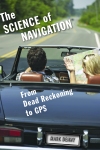Guest post by Mark Denny
The astonishing pace at which humankind has progressed, in terms of navigation if not fellowship, came home a while ago at the start of a vacation. We picked up a rental car at the airport with a dashboard GPS unit on board. These devices are now so common as to hardly merit comment, but back then we didn’t have one—had never used one, saw it as a doodad for other people to play with. Vacationing in a strange town (Vegas—strange to us in more ways than one) however, well, that was a different story. During the first day, we found the GPS to be so useful that I used it to navigate to the local Costco and bought one for myself—exact same model. I returned the hired GPS unit to the car rental company and used my own to drive around three states for the rest of the week.
I chose a female voice for my GPS unit, and this is the only unnatural aspect of its otherwise very intuitive and easy to use interface. Unnatural for me because the voice doesn’t get antsy when I miss a turn. It calmly says “recalculating” instead of bellowing “you missed the turn, jackass!” which I was more used to. Unnatural also, from the point of view of a historian of navigation, because all of the navigators from history and all those people who contributed to understanding the subject, were men.
Women stayed at home back then—navigating was dangerous. Much of the danger involved in ancient long-distance journeys to parts unknown derived from the lack of navigational equipment, both mental and material. Getting lost could be fatal; as one writer on the subject pithily observed, ancient navigators became good or else they disappeared. Navigation tools have improved dramatically since mankind first set out on long journeys, hoping to return to home port one day. The story of that evolution is an interesting one. My dashboard GPS system can tell me in a split second my latitude and longitude, but 500 years ago (a mere seven lifetimes, assuming the biblical span of three score years and ten) nobody could accurately estimate longitude, and only two lifetimes ago it took lengthy observations with cumbersome equipment, followed by equally cumbersome calculations, to fix longitude.
Navigation science is like any other science in that it builds on what has gone before. Isaac Newton once famously said, “If I have seen further, it is because I have stood on the shoulders of giants.” The story of the giants of navigational science is every bit as interesting as the stories of famous navigators, and their collective achievements (neatly encapsulated by a small GPS receiver) are more important to our daily lives.
 Mark Denny is a theoretical physicist who worked in academia and industry. He is the author of a number of books for scholars, students, and general readers, most recently Gliding for Gold: The Physics of Winter Sports; Their Arrows Will Darken the Sun: The Evolution and Science of Ballistics; Super Structures: The Science of Bridges, Buildings, Dams, and Other Feats of Engineering; and The Science of Navigation: From Dead Reckoning to GPS, all published by JHU Press.
Mark Denny is a theoretical physicist who worked in academia and industry. He is the author of a number of books for scholars, students, and general readers, most recently Gliding for Gold: The Physics of Winter Sports; Their Arrows Will Darken the Sun: The Evolution and Science of Ballistics; Super Structures: The Science of Bridges, Buildings, Dams, and Other Feats of Engineering; and The Science of Navigation: From Dead Reckoning to GPS, all published by JHU Press.